Daily Business Report-Dec. 20, 2017
Income tax filing (Illustration courtesy of CALmatters)
Partial Preservation of Income Tax
Deductions Softens Blow to Californians
By Judy Lin | CALmatters
Some Californians are breathing a sigh of relief now that House and Senate Republicans have agreed to a partial preservation of state and local income taxes, but a lot of taxpayers will still be unhappy.
The GOP’s tax agreement announced Wednesday, although not finalized, would allow Californians filing federal taxes to deduct up to $10,000 for state and local income taxes and property taxes combined. Previous versions that emerged out of both the House and Senate had sought to repeal the deduction except for a $10,000 cap on property tax deductions.
Such a move would have been particularly punitive for a blue state like California, which has a progressive income tax rate, taking a greater percentage from higher earners. The loss of the state and local income tax deduction would have impacted over 6 million California households—one out of every three. The new version is expected to hit far fewer households.
“It takes it from horrible to slightly less horrible,” said Assemblyman Phil Ting, D-San Francisco, chair of the Assembly Budget Committee. “For people living in California, it’s an absolute catastrophe because they can’t go deduct all their state income taxes and they may not be able to deduct all their property taxes.”
According to the state Finance Department, the average deduction for state and local income taxes alone is nearly $16,000 per return, while state and local property taxes average less than $6,000 per return.
University of California, Davis law professor Darien Shanske said Wednesday’s changes will mean somewhere between 1 to 2 million households will still be impacted since they exceed the deduction cap.
In anticipation of federal changes, California policy analysts have been mulling possible ways to outmaneuver the congressional Republicans and the Trump administration. Shanske, who co-wrote a paper on the unintended consequences of the tax plan, said California could explore some tax maneuvers to give those taxpayers ways to reduce their federal tax burden.
One example would be to offer Californians state income tax credits if they make charitable contributions to public schools and universities, because those would remain deductible under the GOP plan.
Another complicated idea involves shifting an employee’s income tax burden to the employer’s deductible payroll tax in such a way that it would put the same amount of money in the worker’s pocket.
Ting, who laid out budget priorities to expand healthcare to undocumented immigrants and increase tax credits for the poor, said Democrats in the Legislature will want to tinker with taxes—but that it was too soon to speculate.
“We’re going to wait until the final plan lands and make adjustments,” he said.
“To me,” Ting added, “there hasn’t been an appetite to do significant structural tax reform on behalf of a broader community. What we’re looking at is doing reform that will make a difference and put money back in the pockets of working-class and middle-class Californians. And we haven’t figured out how best to do that because we don’t know what Washington is doing yet.”
________________
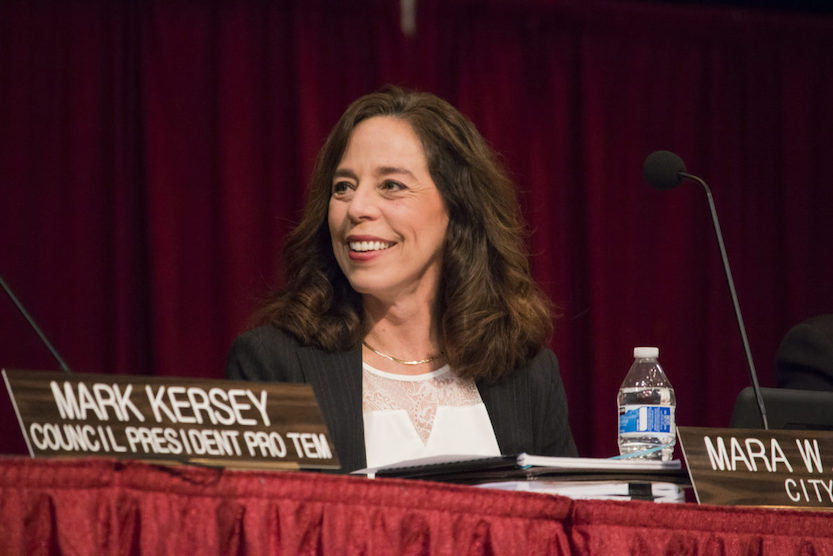
San Diego City Attorney Mara Elliott
is Voice of San Diego’s ‘Voice of the Year’
By Andrew Keatts and Scott Lewis| Voice of San Diego
In her campaign for San Diego city attorney, Mara Elliott pledged to blend in as the city’s dutiful legal counsel.
Elliott said she would make the city attorney’s office – where she was a deputy – less political.
She was nostalgic for the system she’d seen across town at the county of San Diego. There, the county counsel doesn’t take credit for anything the agency achieved, she said. Nobody in the community even knew who the county counsel was.
A year since she took office, though, San Diegans very much know who Mara Elliott is.
She did not blend in. She quickly discovered how important her signature is on major policies. She repeatedly asserted legal interpretations that shaped San Diego’s biggest debates.
Her interpretations have been forceful and disruptive, leaving the mayor and City Council scrambling to pursue its goals within them.
Nowhere was that clearer than in the debate over short-term vacation rentals. Elliott declared all short-term rentals in residential neighborhoods illegal. That forced the mayor into the awkward position of refusing to address what his lawyer says is illegal activity in the city’s neighborhoods.
It made her a hero to those who want to see the city crack down on vacation rentals. But Elliott said she issued her legal opinion to spur the City Council and mayor to act on the issue.
________________
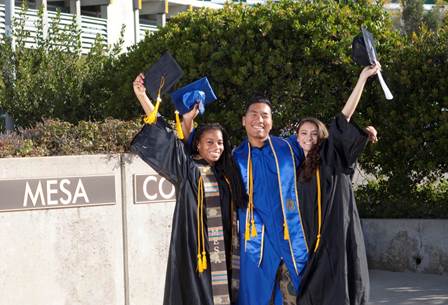
Baccalaureate Pilot Program Receives
Favorable Response from Legislative Office
California’s historic baccalaureate pilot program, which for the first time allows a select number of community colleges to offer bachelor’s degrees, is making progress in addressing the state’s urgent workforce needs but more data is needed for a complete evaluation, according to a new report from the California Legislative Analyst’s Office (LAO).
Each of the 15 programs in the pilot addresses a specific workforce need in their local communities without duplicating any programs at public universities. The report found that these programs, which were launched over the past two years, are viewed favorably by both employers and students.
At site visits conducted by the LAO, many students described themselves as place-bound and would not otherwise be able to pursue their bachelor’s degree if one weren’t available at their local community college.
San Diego Mesa College welcomed its first cohort of health information management enrollees in fall 2016. Those students, who are mostly female and made up of students of color, are on track to graduate with their bachelor’s degrees in May 2018. They are expected to command starting salaries ranging from $80,000 to $120,000.
San Diego Community College District Chancellor Constance Carroll believes that the LAO report paves the way for new legislation to extend the program’s current sunset provision. Currently, the baccalaureate pilot program would end in 2023.
________________

KASHL Corp Acquires Radisson Hotel
San Diego-Rancho Bernardo
KASHL Corp has acquired the 178-room Radisson Hotel San Diego-Rancho Bernardo, 11520 West Bernardo Court in San Diego, for an undisclosed price. The seller was an affiliate of San Diego-based Pinnacle Hotels USA Inc. RAR Hospitality was selected to manage the hotel.
Opening in 1989, the three-story hotel sits on 3.61 acres and offers 4,000 square feet of meeting space, an outdoor pool in an interior courtyard, and provides guests with food and beverage service through its C3 Restaurant and Bar.
CBRE Hotels represented the seller in the transaction.
________________
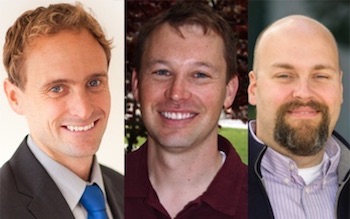
Company Based on UC San Diego
Technology Gets Infusion of Capital
UC San Diego News Center
A company co-founded by CSE professor and Qualcomm Institute academic participant Ryan Kastner and two CSE alumni is now positioned for new growth thanks to an infusion of capital from a venture-capital firm.
The hardware security company Tortuga Logic just reported receiving $2 million in seed funding, all of it coming from Eclipse Ventures to accelerate engineering efforts and expand sales and marketing. Tortuga Logic offers a suite of hardware design tools to identify security vulnerabilities throughout the process of designing a semiconductor, including Prospect and Unison (used in the semiconductor, aerospace and defense industries). With its new funding, Tortuga Logic will develop new products and increase the feature sets of existing products.
The company’s co-founder and CEO Jason Oberg (M.S., Ph.D. ’12, ’14) also announced on Dec. 14 the hiring of a new VP of Engineering, Andrew Dauman. “We are seeing a huge paradigm shift in cybersecurity,” said Oberg, who co-founded the company while still a Ph.D. student in CSE. “Existing software-based cybersecurity companies address software vulnerabilities but overlook hardware. With a round of seed funding and Andrew Dauman’s leadership, we are fully prepared to take on the challenge of eliminating hardware vulnerabilities.”
Tortuga Logic’s technology, based on previous research carried out in the lab of CSE professor Kastner at UC San Diego, identifies and prevents security vulnerabilities in system-on-chip (SoC) designs. Its patented technology augments industry-standard verification tools to enable a secure development lifecycle.
The company was co-founded by experts and pioneers in the hardware security space. In addition to UC San Diego’s Kastner and CEO Oberg, Tortuga Logic’s co-founders also include UC Santa Barbara computer-science professor Tim Sherwood, who is also a CSE alumnus (M.S., Ph.D. ’03), and his former student, Chief Operating Officer Jonathan Valamehr, who earned all of his degrees from UC Santa Barbara.
Tortuga Logic’s products fill a gap between the intent of security IP building blocks and their actual deployment in full SoC designs. “Without these products, chips will continue to be built in ways that leave them vulnerable to hackers,” said new VP Dauman. “Our goal is to ensure the chip’s final implementation does not expose a security hole that software will exploit.”
________________
Sam Attisha to Take Reins of San Diego
Regional Chamber of Commerce Board
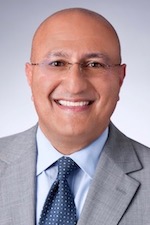
Sam Attisha, senior vice president and region manager of Cox California will become chair of the San Diego Regional Chamber of Commerce Board of Directors in January. He assumes the role from Ernesto Arredondo Jr., executive vice president and chief banking officer at Seacoast Commerce Bank, who has served as chair since April 2016.
As chair, Attisha will lead the chamber’s 80-member board that establishes the organization’s policy positions on issues important to job creation and business growth in the region. He has served on the chamber board since 2009.
Assuming the role of vice chair will be Rick Bregman, San Diego market president of Bank of America. Bregman currently serves as chair of the Finance Committee.
A ceremonious transition of the board chair position will take place at the chamber’s 147th anniversary celebration on Feb. 6, 2018.
________________
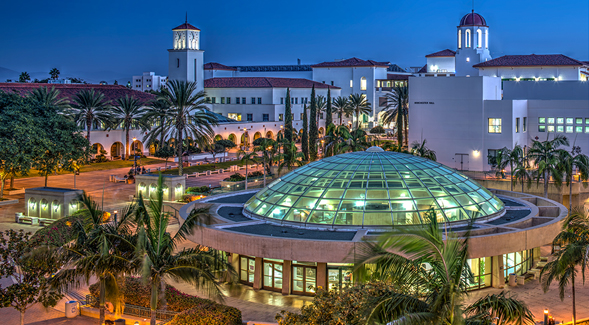
SDSU Receives Record 93,610
Undergraduate Applications for Fall
SDSU NewsCenter
San Diego State University has received a record-setting 93,610 undergraduate applications for fall 2018. The application period for fall 2018 closed on Nov. 30. SDSU also received more than 3,000 graduate applications for a total of more than 96,000 applications to date for fall 2018 admission. The final numbers are expected to increase as many of the university’s graduate programs are still accepting applications.
Among the undergraduate applicants are 68,475 first-time freshmen and 25,135 transfer students. The most popular majors chosen by this cohort of first-time freshman applicants were biology, business, nursing and psychology.
________________
Personnel Announcements
Anna-Marie Rooney Joins The Scripps Research Institute
The Scripps Research Institute (TSRI) announced that Anna-Marie Rooney has been hired as vice president of communications to direct all marketing strategy and communications efforts for the institute and its affiliates. She joined TSRI in late November.
Rooney will orchestrate the overall marketing strategy and branding for the institute, coordinating the messaging via Internet presence and print publications. She will direct media relations, electronic communications and social media outreach, and she will devise targeted campaigns to augment TSRI’s development endeavors.
Prior to joining TSRI, Rooney was chief communications officer at the Salk Institute. There she oversaw all communications and media relations. Under her leadership, both the website and institute magazine were redesigned, ultimately earning a number of industry awards.
Preceding that role, she served as vice president/chief strategy and brand officer for The San Diego Foundation, the largest community foundation in the San Diego region.
A Colorado native, Rooney earned her degree in communications with an emphasis on marketing and public speaking from the University of Denver.

